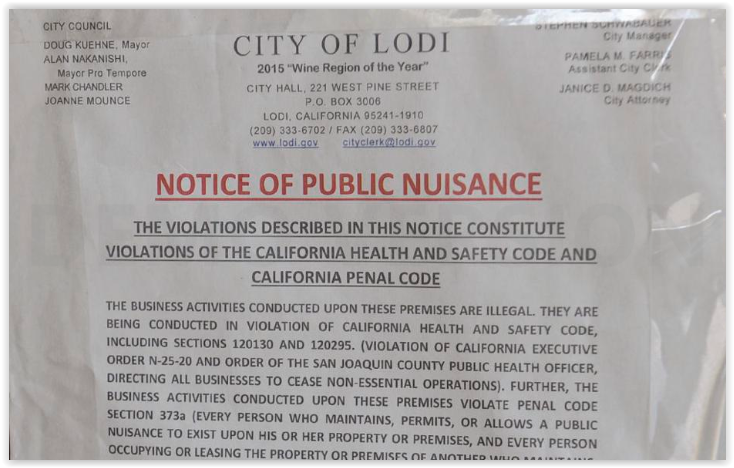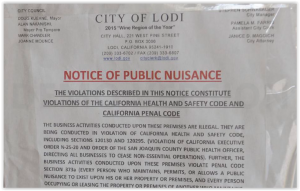
Churches Say: “You’re not the Boss of Me!”
- By Sam Field --
- 08 Apr 2020 --
 Pastor Jon Duncan of the Cross Culture Christian Center in Lodi, Calif., has been ordered by the San Joaquin County Department of Health to stop religious gatherings. The Church, which has continued to hold in-person services during the Coronavirus pandemic has been labeled a “public nuisance” and a “non-essential service” by the county, according to Church attorney Dean R. Broyles. Pastor Duncan disagrees with that assessment, of course, and said that while his congregation will follow the CDC’s recommendations to prevent the spread of the Coronavirus, on Palm Sunday he will hold services anyway. The stage is set, the media is there, what will happen?
Pastor Jon Duncan of the Cross Culture Christian Center in Lodi, Calif., has been ordered by the San Joaquin County Department of Health to stop religious gatherings. The Church, which has continued to hold in-person services during the Coronavirus pandemic has been labeled a “public nuisance” and a “non-essential service” by the county, according to Church attorney Dean R. Broyles. Pastor Duncan disagrees with that assessment, of course, and said that while his congregation will follow the CDC’s recommendations to prevent the spread of the Coronavirus, on Palm Sunday he will hold services anyway. The stage is set, the media is there, what will happen?
While one may dispute the wisdom of continuing to hold group church services in the face of the Coronavirus pandemic — most houses of worship have closed or are meeting online and some outbreaks have been traced to religious gatherings — a number of religious leaders are making the point that the right to hold religious services without interference is guaranteed by the U.S. Bill of Rights, the Universal Declaration of Human Rights and other standards of religious liberty.
The First Amendment reads: “Congress shall make no law respecting an establishment of religion, or prohibiting the free exercise thereof; or abridging the freedom of speech, or of the press; or the right of the people peaceably to assemble, and to petition the government for a redress of grievances.” So orders to shut churches down would appear to violate the “Prohibiting the free exercise thereof,” as well as the “peaceably to assemble” assurance.
Critics may say that it’s the state, county or the city doing the abridging, not Congress, and President Trump has avoided a national prohibition, saying he leaves that to the states. But a number of legal decisions have held that the Bill of Rights applies to states as well as to Congress.
The Universal Declaration of Human Rights Article 18 – drafted by a committee chaired by Eleanor Roosevelt and signed by the United States in 1948 – says: “Everyone has the right to freedom of thought, conscience and religion; this right includes freedom to change his religion or belief, and freedom, either alone or in community with others and in public or private, to manifest his religion or belief in teaching, practice, worship and observance.”
That makes a pretty strong case for religious leaders who dispute the authority of the World Health Organization, Health and Human Services, the Centers for Disease Control – or a doctor from a county department of health – to challenge that right.
Religious Liberty is currently on the front lines of a number of legal battles – some have risen to the U.S. Supreme Court’s docket but have been temporarily deferred by the virus threat. Forcing an organization of Catholic nuns to provide birth control to employees, forcing ministers and priests to perform same-sex weddings, forcing Christian-based organizations to service same-sex weddings, coming-out parties, or transgender celebrations, are widely seen as government overstepping its authority. And orders to stay at home, close churches and organizations because of a virus are easily lumped with the dissatisfaction at how religions are treated by legislatures and the courts.
Perhaps these worries are out of proportion with the perceived threat to religious liberty, but recently there have been whiffs of something darker. Even as China’s Communist government demolishes Christian churches and blows up Buddhist statues in the name of public safety, former Democratic presidential candidate Beto O’Rourke said he would support revoking the tax-exempt status of religious institutions if they opposed same-sex marriage, and this past week New York City Mayor Bill de Blasio threatened to permanently close churches who continued to operate during the virus pandemic.
And once the battle begins, the fringes – people who feel “God will protect us so why be careful” on one side, to those that think “religion is a stupid thing and who are churches to defy the law?” on the other – weigh in and pretty soon you have a lot of upset people.
So what happened to Lodi Pastor Jon Duncan’s Palm Sunday Service?
Duncan was met on Palm Sunday by police, and because of threats to himself and his church agreed to stand down and not hold service. “I don’t believe the virus suspends the First Amendment,” he said, but instead of holding the scheduled church service, Pastor Duncan greeted parishioners in their cars at the curb.
So while the immediate need is to stay at home and keep a safe distance from one another, the right to gather and worship should not be eroded by government at any level. Government mandates may be necessary from time to time, but with rights as fundamental as religious worship, those mandates must defer to the informed decisions and the good sense of those most concerned.
Informed decisions and good sense require good information. A very good presentation of the reality of the COVID-19 virus is by Dr. David Price of Weil Cornell Medical Center in his YouTube video. His message is that simple precautions can protect you and your family, and this is a time to think not only of self, but of others and how to protect them. As Benjamin Franklin said, “God helps those that help themselves.”




















